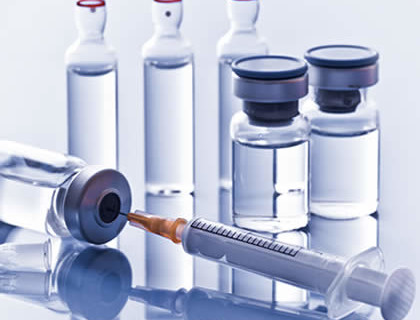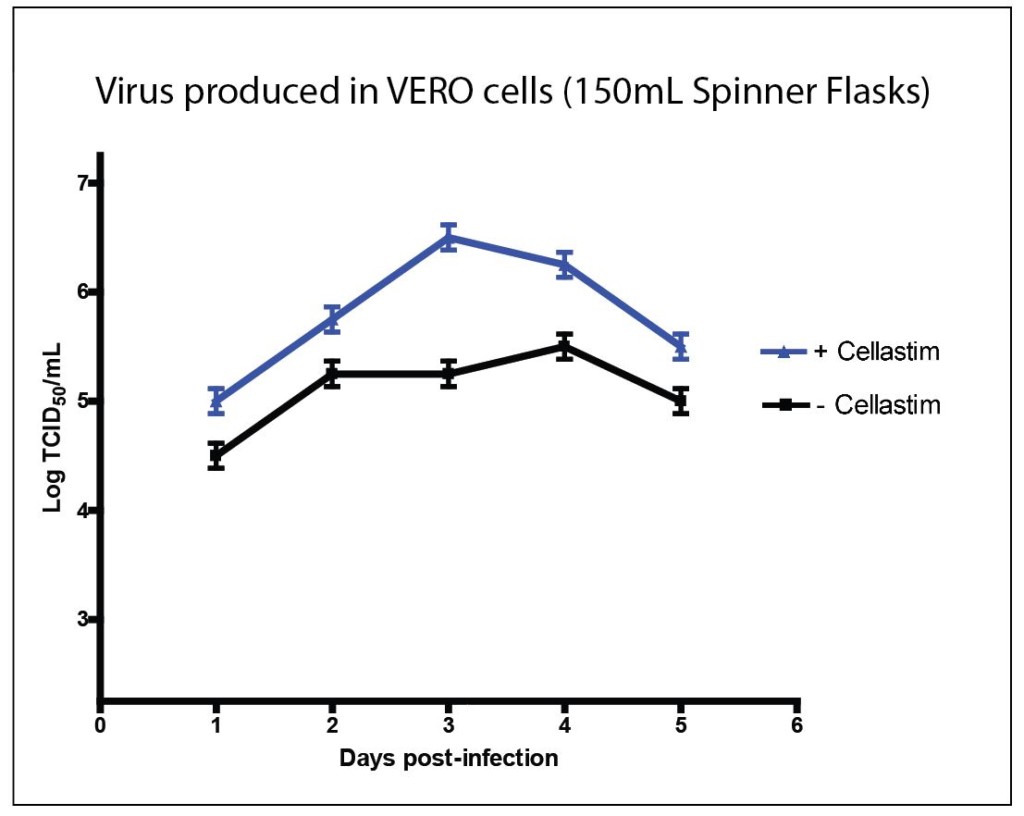
Mitigating Risk beyond Xeno-Free: Virus Stabilization during Culture and Final Formulation
Previously, we demonstrated the critical importance of the animal component free recombinant human serum albumin product Cellastim in the expansion of cells relevant in virus production for vaccines using cell lines VERO and MRC-5. The expansion capability of media formulations completely void of any human serum or animal serum components was greatly enhanced by the addition of Cellastim. With further optimization, these animal component free (ACF) media performed equivalently to 10% FBS-containing medium in plates, flasks, and 150 mL spinners. Taken together, addition of Cellastim can greatly enhance the performance of serum free media.
That being said, cell growth is only a single piece of a multifaceted process that in the end yields an acceptable virus productivity for any given cell culture process. Ensuring that the produced virus is stable from the production phase through purification and final formulation is absolutely critical in maximizing virus productivity and manufacturing efficiency. Here we provide evidence that Cellastim has inherent virus stabilization activity that is equivalent to human serum derived albumin.
Using 150 mL spinner cultures, we have demonstrated that additional Cellastim supplementation to VERO cells expanded in serum free media on microcarriers one day post infection can significantly boost the virus production. Although preliminary, it is hypothesized that addition of Cellastim to spinners protects the virus particles from shear forces present in the dynamic culture environment (Figure 1), thus stabilizing virus activity during the cell culture process.

Wiggan et al., has expanded upon these initial observations to deliver further evidence that Cellastim provides thermal stability to the attenuated dengue type 2 (DEN-2), strain PDK-53 (DEN-2 PDK) vaccine1. This system has been utilized as a viral vector for the engineering of both dengue and West Nile vaccines and has been shown to induce long term immunity in human clinical testing.
Using DEN-2 PDK, this study noted that the formulation agents 15% Trehalose, 2% F127, and 1% Cellastim preserved 5.1±0.2, 2.4±0.1, and 5.5±0.2 percent of viral titer after 21 hours at 37˚C, respectively1. These individual components were significantly active in stabilizing DEN-2 PDK versus PBS alone, in which less than 0.5 % of the initial virus titer was detected. However, when either Trehalose or F127 were combined with Cellastim, a 5-6 fold increase in percent virus titer remaining after 21 hours was observed1. Further, the inclusion of all 3 components further enhanced the stabilization effects to 32.7±3.1%1. This formulation was shown to be capable of lyophilization with minimal loss in virus titer after 195 days at room temperature and able to protect DEN-2 PDK-53 to equivalent levels of 20% fetal bovine serum after 2 freeze thaw cycles1.
These initial findings were expanded with various other chimeric flaviviruses, including Sanofi Pasteur’s Yellow Fever (YFV) 17-D (YF-VAX) and JEV SA 14-14-2 to determine if Cellastim has broad stabilization activity. Interestingly, the Yellow Fever 17-D vaccine was resistant to degradation of virus in PBS alone. However, the 14-14-2 virus exhibited a significant increase in the percent of surviving virus in the 15% Trehalose, 2% F127 with 0.1% Cellastim versus PBS alone1.
To summarize, not only does Cellastim enhance growth of virus production cell lines in animal component free conditions, but it has also proven to be a powerful stabilization agent when incorporated into a final formulation buffer and protect virus during lyophilization. The regulatory and safety advantages of an animal component free recombinant human serum albumin, in addition to the upstream and downstream benefits observed when Cellastim is added to vaccine production processes, make it easy to see why Cellastim has already been incorporated into a number of novel vaccine production processes. To learn more about how to incorporate Cellastim into your vaccine development research, e-mail CellCultureInfo@InVitria.com or call (800) 916-8311.
Footnotes
-
1. Wiggan O et al., Novel formulations enhance the thermal stability of live-attenuated flavivirus vaccines. Vaccine. 2011. ; 29(43):7456-7462.